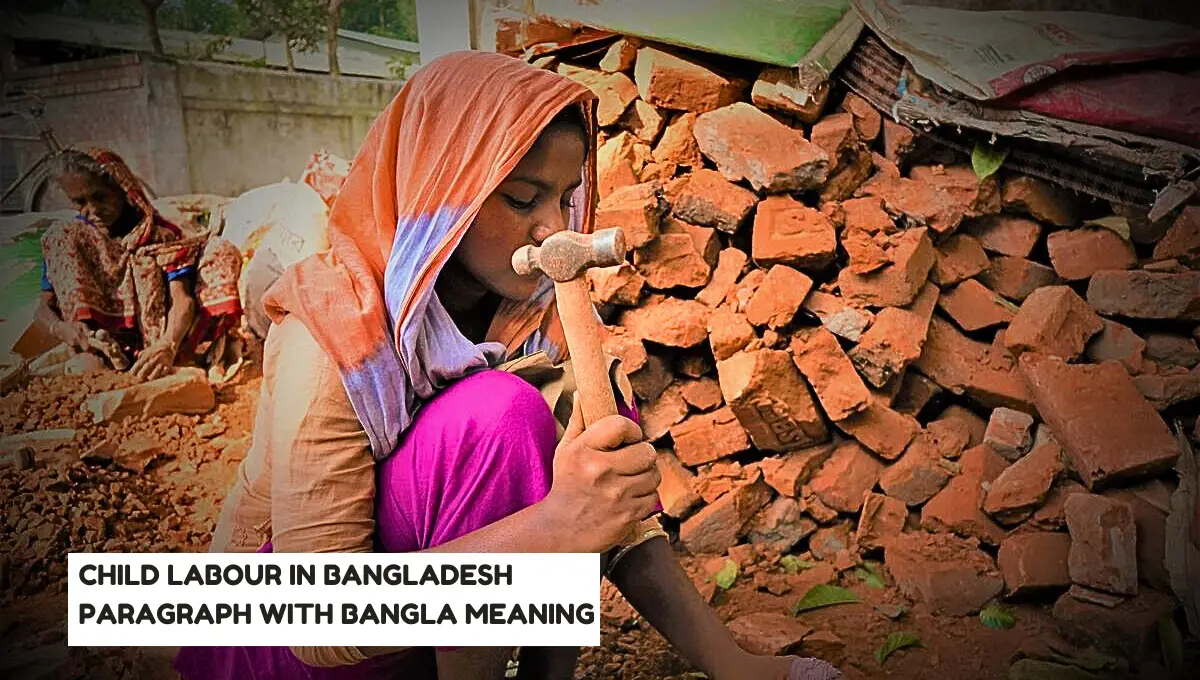Child labour is a scary problem that still exists in many places worldwide. It’s a sad reality that affects Bangladesh too. This South Asian country is known for its rich culture and strong economy. But it is sadly plagued by the widespread use of child labour. In this article, we will explore the issue of child labour in Bangladesh. Why it is happening, its negative effects , and why it’s necessary to work together to stop this problem.
Child labour, like a thief, steals away the innocence of childhood. Sadly, it affects millions of children in Bangladesh. It has taken away the right of children to get educated, nurture with good health and enjoy a typical childhood. According to the most recent estimates, 4.9 million children between the ages of 5 and 17 work in risky occupations countrywide. This huge number makes us wonder if the laws in place are effective enough and if there’s a genuine commitment to tackle this problem directly.
Child labour in Bangladesh has many causes. Poverty, lack of education, and a large population all play a role in this concerning issue. The families can’t make their bread and butter, that’s why they have no choice but to make their children work to earn extra money. Moreover, there aren’t enough good opportunities for education, and many people don’t know about children’s rights, which keeps child labour going. Unfortunately, there are also bad companies who exploit defenseless kids and use them for low-paying labour, worsening the issue.
Child labour negatively impacts kids’ physical and mental health. They are forced to work in unsafe places without safety measures, putting them in danger of getting hurt, getting sick, or experiencing delays in growing up. These children are not given the opportunity to learn important skills and gain knowledge, which affects their future chances. Furthermore, child labour steals their childhood, joy, and innocence, leaving lasting impacts on their self-belief and overall development.
The Bangladesh government knows child labour is a big problem and made laws to stop it. The Bangladesh Labor Act of 2006 and the National Child Labor Elimination Policy of 2010 made rules to stop children from being treated unfairly. But we can’t make sure people follow these rules because they don’t have enough resources. Corruption is the biggest issue of the country and people aren’t aware of this. To solve this problem well, the authorities need to be more committed and make stricter rules to make sure the laws are obeyed.
The clothing industry in Bangladesh is very important in the worldwide supply chain. However, people are criticising this industry because they use child labour. This raises important ethical concerns for global brands that get their products from Bangladesh. Are these brands doing enough to make sure their supply chains are free from child labour? The government of Bangladesh isn’t just responsible for this issue but multinational companies and consumers around the world also play a role. By supporting ethical practices and demanding transparency, we can all contribute to ending child labour in Bangladesh.
Education is the solution to stop child labour. By providing good education, especially to disadvantaged groups, we empower children to build a brighter future. We need to make education easier to get, improve its quality, and tell people about the dangers of child labour. Working with local communities, parents, and children themselves is important to make sure everyone understands and is committed to stopping child labour.
Child labour in Bangladesh has been a significant problem for a while. It needs immediate action. We can bring about change by addressing the main causes, making laws stricter, and encouraging ethical actions. Let’s improve all of these things and build a society that respects and protects children’s rights. By working together, we can make a difference.
বাংলা অনুবাদ
শিশুশ্রম একটি ভীতিকর সমস্যা যা এখনও বিশ্বব্যাপী অনেক জায়গায় বিদ্যমান। এটি একটি দুঃখজনক বাস্তবতা যা বাংলাদেশকেও প্রভাবিত করে। দক্ষিণ এশিয়ার এই দেশটি তার সমৃদ্ধ সংস্কৃতি এবং শক্তিশালী অর্থনীতির জন্য পরিচিত। কিন্তু দুঃখজনকভাবে শিশুশ্রমের ব্যাপক ব্যবহারে এটি জর্জরিত। এই নিবন্ধে, আমরা বাংলাদেশে শিশুশ্রমের সমস্যাটি অন্বেষণ করব। কেন এটি ঘটছে, এর নেতিবাচক প্রভাব এবং কেন এই সমস্যাটি বন্ধ করার জন্য একসাথে কাজ করা প্রয়োজন।
শিশুশ্রম চোরের মতো শৈশবের নিষ্পাপতা কেড়ে নেয়। দুঃখজনকভাবে, এটি বাংলাদেশের লক্ষ লক্ষ শিশুকে প্রভাবিত করে। এটি শিশুদের শিক্ষিত, সুস্বাস্থ্যের সাথে লালন-পালন এবং একটি সাধারণ শৈশব উপভোগ করার অধিকার কেড়ে নিয়েছে। সাম্প্রতিকতম অনুমান অনুসারে, 5 থেকে 17 বছর বয়সী 4.9 মিলিয়ন শিশু দেশব্যাপী ঝুঁকিপূর্ণ পেশায় কাজ করে। এই বিশাল সংখ্যাটি আমাদের আশ্চর্য করে তোলে যে আইনগুলি যথেষ্ট কার্যকর কিনা এবং এই সমস্যাটি সরাসরি মোকাবেলা করার জন্য সত্যিকারের প্রতিশ্রুতি আছে কিনা।
বাংলাদেশে শিশুশ্রমের অনেক কারণ রয়েছে। দারিদ্র্য, শিক্ষার অভাব এবং বিশাল জনসংখ্যা সবই এই সমস্যায় ভূমিকা পালন করে। পরিবারগুলি তাদের রুটি এবং মাখন তৈরি করতে পারে না, তাই তাদের সন্তানদের অতিরিক্ত অর্থ উপার্জনের জন্য কাজ করা ছাড়া আর কোন উপায় নেই। তাছাড়া, শিক্ষার জন্য পর্যাপ্ত ভালো সুযোগ নেই, এবং অনেক মানুষ শিশুদের অধিকার সম্পর্কে জানে না, যা শিশুশ্রমকে অব্যাহত রাখে। দুর্ভাগ্যবশত, এমনও খারাপ কোম্পানি আছে যারা প্রতিরক্ষাহীন শিশুদের শোষণ করে এবং তাদের কম বেতনের শ্রমের জন্য ব্যবহার করে, সমস্যাটিকে আরও খারাপ করে।
শিশুশ্রম শিশুদের শারীরিক ও মানসিক স্বাস্থ্যকে নেতিবাচকভাবে প্রভাবিত করে। তারা নিরাপত্তা ব্যবস্থা ছাড়াই অনিরাপদ জায়গায় কাজ করতে বাধ্য হয়, তাদের আঘাত পাওয়ার, অসুস্থ হওয়ার বা বড় হতে দেরি হওয়ার ঝুঁকিতে ফেলে। এই শিশুদের গুরুত্বপূর্ণ দক্ষতা শেখার এবং জ্ঞান অর্জনের সুযোগ দেওয়া হয় না, যা তাদের ভবিষ্যতের সম্ভাবনাকে প্রভাবিত করে। অধিকন্তু, শিশুশ্রম তাদের শৈশব, আনন্দ এবং নির্দোষতা কেড়ে নেয়, যা তাদের আত্মবিশ্বাস এবং সামগ্রিক বিকাশের উপর স্থায়ী প্রভাব ফেলে।
বাংলাদেশ সরকার জানে শিশুশ্রম একটি বড় সমস্যা এবং এটি বন্ধ করতে আইন করেছে। 2006 সালের বাংলাদেশ শ্রম আইন এবং 2010 সালের জাতীয় শিশুশ্রম নির্মূল নীতি শিশুদের সাথে অন্যায় আচরণ করা বন্ধ করার জন্য নিয়ম তৈরি করেছে। কিন্তু আমরা নিশ্চিত করতে পারি না যে লোকেরা এই নিয়মগুলি অনুসরণ করছে কারণ তাদের কাছে পর্যাপ্ত সংস্থান নেই। দুর্নীতি দেশের সবচেয়ে বড় সমস্যা এবং মানুষ এ বিষয়ে সচেতন নয়। এই সমস্যাটি ভালভাবে সমাধান করার জন্য, কর্তৃপক্ষকে আরও প্রতিশ্রুতিবদ্ধ হতে হবে এবং আইনগুলি মানা হয় তা নিশ্চিত করার জন্য কঠোর নিয়ম তৈরি করতে হবে।
বিশ্বব্যাপী সরবরাহ শৃঙ্খলে বাংলাদেশের পোশাক শিল্প অত্যন্ত গুরুত্বপূর্ণ। তবে মানুষ এই শিল্পের সমালোচনা করছে কারণ তারা শিশুশ্রম ব্যবহার করে। এটি বিশ্বব্যাপী ব্র্যান্ডগুলির জন্য গুরুত্বপূর্ণ নৈতিক উদ্বেগ উত্থাপন করে যারা বাংলাদেশ থেকে তাদের পণ্যগুলি পায়। এই ব্র্যান্ডগুলি কি তাদের সাপ্লাই চেইন শিশু শ্রম থেকে মুক্ত তা নিশ্চিত করার জন্য যথেষ্ট কাজ করছে? এই সমস্যার জন্য শুধু বাংলাদেশ সরকারই দায়ী নয়, বিশ্বের বহুজাতিক কোম্পানি এবং গ্রাহকরাও ভূমিকা পালন করে। নৈতিক অনুশীলনকে সমর্থন করে এবং স্বচ্ছতার দাবি করে, আমরা সবাই বাংলাদেশে শিশুশ্রম বন্ধে অবদান রাখতে পারি।
শিক্ষাই শিশুশ্রম বন্ধের সমাধান। সুশিক্ষা প্রদানের মাধ্যমে, বিশেষ করে সুবিধাবঞ্চিত গোষ্ঠীর জন্য, আমরা শিশুদের একটি উজ্জ্বল ভবিষ্যৎ গড়তে ক্ষমতায়ন করি। আমাদের শিক্ষাকে সহজতর করতে হবে, এর গুণগত মান উন্নত করতে হবে এবং শিশুশ্রমের বিপদ সম্পর্কে মানুষকে জানাতে হবে। স্থানীয় সম্প্রদায়, পিতামাতা এবং শিশুদের সাথে কাজ করা নিশ্চিত করা গুরুত্বপূর্ণ যে সবাই বুঝতে পারে এবং শিশু শ্রম বন্ধ করতে প্রতিশ্রুতিবদ্ধ।
বাংলাদেশে শিশুশ্রম একটি উল্লেখযোগ্য সমস্যা হয়ে দাঁড়িয়েছে কিছুদিন ধরে। এটি অবিলম্বে পদক্ষেপ প্রয়োজন. আমরা প্রধান কারণগুলিকে সমাধান করে, আইন কঠোর করে এবং নৈতিক ক্রিয়াকলাপকে উত্সাহিত করে পরিবর্তন আনতে পারি। আসুন এই সমস্ত কিছুর উন্নতি করি এবং এমন একটি সমাজ গড়ে তুলি যা শিশুদের অধিকারকে সম্মান করে এবং রক্ষা করে। একসাথে কাজ করে, আমরা একটি পার্থক্য করতে পারি।
গুরত্ব পূর্ণ শব্দের অর্থ
Child labour (শিশু শ্রমিকতা), Bangladesh (বাংলাদেশ), Poverty (দারিদ্র্য), Education (শিক্ষা), Exploitation (শোষণ), Rights (অধিকার), Laws (আইন), Government (সরকার), Risky occupations (জোক্সহকারী পেশা), Innocence (সদ্ভাবনা), Health (স্বাস্থ্য), Safety measures (সুরক্ষা ব্যবস্থা), Future chances (ভবিষ্যৎ সুযোগ), Development (উন্নয়ন), Corruption (দূর্নীতি), Resources (সম্পদ), Clothing industry (পোশাক শিল্প), Supply chain (সরবরাহ সংলগ্নতা), Ethics (নৈতিকতা), Multinational companies (বহুজাতিক কোম্পানি), Consumers (উপভোগকারী), Transparency (পারদর্শিতা), Disadvantaged groups (সমস্যাগ্রস্থ গোষ্ঠী), Empowerment (শক্তিপ্রাপ্তি), Brighter future (উজ্জ্বল ভবিষ্যৎ), Local communities (স্থানীয় সম্প্রদায়), Parents (মাতাপিতা), Action (কর্ম)

